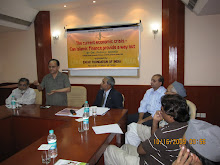Pubslihed in the Florida Times Union on Aug 8, 2008
http://www.jacksonville.com/tu-online/stories/080808/opl_315487458.shtml
http://usa.mediamonitors.net/content/view/full/53237
By Lawrence Davidson and Parvez Ahmed
About a year and half ago WorldPublicOpinion.org did a survey and found that majority of Americans and Iranians agree with the statement, "Most people in the West and the Islamic world have similar needs and wants, so it is possible to find common ground." Only about a third of Americans and only a quarter of Iranians choose the counter-argument that "Islamic and Western religious and social traditions are incompatible with each other."
Despite such aspirations to find common ground, American-Iranian relations remain at a dangerous impasse. Earlier in July, after Iran fired long-range missiles, U.S. Secretary of State Condoleezza Rice shot back reiterating that the United States remains determined to prevent Iran from threatening the interests of America and its allies, particularly Israel. The media hoopla that predictably ensued was largely devoid of the historical context to the unfolding events. That history shows that in the twentieth century Iran has been subject to interference and aggression by outside powers including Iraq, Russia, Great Britain and the United States. It is the U.S. which overthrew a democratically established Iranian government in 1953 substituting for it the dictatorship of the Shah. The bellicose position of the Bush administration is quite in tune with this history and, predictably, brings forth heightened reactions from Teheran.
The more America provokes, the worse Iran reacts, which in turn leads to harsher recriminations from Washington. This cycle of mutual bellicosity is exasperated by the Israeli claim that an assumed Iranian desire for nuclear weapons poses an "existentialist threat" to Israel. This claim is undoubtedly fueled by Iranian President Ahmedinajd's rhetorical desire to see the "regime now occupying Jerusalem vanish from the page of time," but also realistically is a far cry from any imminent "existential" threat. The Iranians have neither the capacity now nor will in the foreseeable future (if ever), to "wipe Israel off the map,” (which is a mistranslation of what Ahmedinajd actually said).
Yet a diplomatic resolution is not that far-fetched an idea. A framework for peace exists.
In a New Review of Books article Thomas Pickering, former US Ambassador to UN, proposed, "that Iran's efforts to produce enriched uranium and other related nuclear activities be conducted on a multilateral basis, that is to say jointly managed and operated on Iranian soil by a consortium including Iran and other governments....a multinational program will reduce the risk of proliferation and create the basis for a broader discussion not only of our disagreements but of our common interests as well." The article goes on to make a case for urgent diplomatic engagement.
Iran also appears to be seeking such engagement. For instance, in 2003 Iran proposed direct talks with U.S. only to be rebuffed. The Boston Globe in a May 31 article reported that Iran had made a proposal to the UN secretary general suggesting, "six months of negotiations on regional security, the Israel-Palestinian conflict, energy cooperation, and narcotics trafficking, as well as ways to improve international nuclear safeguards and monitoring and prevent the diversion of nuclear material." David Albright, president of the Institute for Science and International Security, a Washington-based think tank, said the Iranian offer "shows a willingness" to negotiate.
Adding to this, there are other facts that further underscore the case for peace. Republican Senator Lugar points out that a confrontation with Iran could trigger economic collapse at home and abroad should Iran's oil and gas resources be withdrawn from the global energy market and the sea lanes through the Straits of Hormuz disrupted. Further, Teheran has cooperated with the U.S. in the "war on terror." This reflects Iran's overwhelming rejection of bin Laden and his murderous ideology. And finally, hostility toward Iran is compounding the harm done to America's image by the invasion and occupation of Iraq.
Five countries with a Muslim-majority and four with Muslim-minority publics surveyed by Pew viewed Iran much more favorably than the United States. Can the U.S. afford to alienate the Muslim world even more than it already has? And how will such disregard for the hearts and minds of a billion Muslims help America's interests?
Sadly inane suggestions of Senator McCain that we "bomb Iran" or kill them by exporting more cigarettes only serves the interests of those failed ideologues that dragged us into a disastrous war with Iraq. American taxpayers must forcefully tell their politicians that hostility with Iran is not in our nation's interests. It does not make America more safe or free or respected. It is now time to give peace a chance. The recent meeting between a Nicholas Burns, the third ranking member in the U.S. State Department, and the top nuclear negotiator for Iran is a step in the right direction.
[Lawrence Davidson is professor of history at West Chester University and Parvez Ahmed is associate professor at the University of North Florida.]
Blog Archive
-
►
2014
(1)
- ► April 2014 (1)
-
►
2010
(13)
- ► December 2010 (2)
- ► April 2010 (11)
-
►
2009
(6)
- ► October 2009 (2)
- ► April 2009 (2)
-
▼
2008
(9)
- ► September 2008 (3)
- ► April 2008 (1)
-
►
2006
(1)
- ► October 2006 (1)

















No comments:
Post a Comment